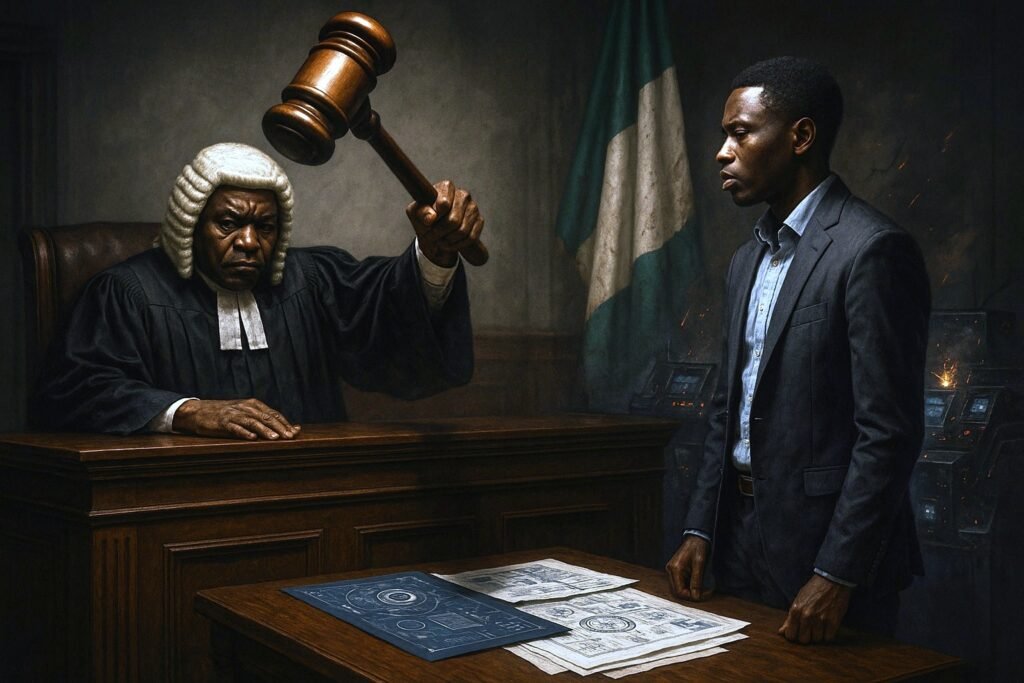Basil Odilim
On May 2, 2025, a federal judge in Abuja handed down a ruling so constitutionally troubling and legally unsound that it demands not just immediate appeal but an urgent national reckoning. The case, filed by eNaira Payment Solutions Ltd against the Central Bank of Nigeria (CBN), the Registrar of Trademarks, and the Corporate Affairs Commission, appeared on the surface to be a simple legal question: Who lawfully owns the name “eNaira”?
But what emerged from the courtroom was a judicial pronouncement that shattered the boundaries of reason and law. Hon. Justice James Omotosho declared that “eNaira” is a national asset, owned by the Nigerian state—a conclusion not derived from evidence, legal argument, or statutory interpretation, but from a unilateral and unsolicited assertion by the court itself. There was no law cited. No fact relied upon. No constitutional basis. It was an ex mero motu declaration that bypassed due process and flouted the principle of fair hearing guaranteed under Section 36(1) of the Nigerian Constitution.
This ruling marks a dangerous precedent for Nigeria’s entrepreneurial class. It falsely equates a sovereign asset with a private intellectual property—two legal constructs that are not only distinct but incompatible. Sovereign assets are communal resources—like mineral wealth or national defense infrastructure—administered on behalf of the people. A trademark, however, is a private right designed to protect innovation, branding, and economic identity. In conflating these terms, the court rendered innovation in Nigeria vulnerable to political confiscation.
Even more disconcerting was the court’s failure to consider Nigeria’s obligations under international law. Our company, Mefona LLC, lawfully registered the “eNaira” trademark under the Madrid Protocol in 2021—recognized globally by the World Intellectual Property Organization (WIPO). Instead of challenging this registration through WIPO, the CBN attempted an underhanded strategy: they forum-shopped, seeking to invalidate our U.S. trademark rights by claiming that “eNaira” was a sovereign asset of the Nigerian state. This cynical move failed—resoundingly.
The U.S. Trademark Trial and Appeal Board (TTAB) rejected the CBN’s claim, siding with Mefona LLC and upholding the rule of law. There, in a foreign jurisdiction, where influence peddling and judicial capture are not part of the system, justice was blind, impartial, and principled. Contrast that with Nigeria, where the judiciary appears increasingly hijacked by the executive branch, and where litigants are told to “go to court” as a cruel joke—only to find a court that rubber-stamps tyranny in legalese.
This embarrassment is not ours alone—it is Nigeria’s. It is a humiliation for a country whose central bank behaved like a lawless actor, resorting to judicial manipulation and deceit to seize what it could not lawfully acquire. It reveals a government that not only bullies its own citizens but seeks to export that impunity abroad—only to be stopped cold by a system where courts are not playthings of power.
The cost of this charade is devastating. Investors have fled. Confidence in the rule of law has plummeted. Our brand suffered reputational harm, and the message to Nigerian innovators could not be clearer: Build at your own risk. If your innovation becomes too successful—too visible—it may be expropriated under the guise of national interest. And the courts, rather than shield you, may be the very instruments used to crush you.
We are appealing this ruling, but this is no longer just our fight. It is a referendum on the soul of Nigerian justice. It is a call to action for the Nigerian Bar Association, the National Assembly, the press, civil society, and all defenders of democracy. The future of innovation in Nigeria cannot rest on shifting sands of judicial unpredictability and executive overreach. It must be anchored in the rule of law.
If we do not act, the brain drain will accelerate. The best and brightest will continue to take flight—to jurisdictions where rights are respected and entrepreneurs are protected. Left behind will be a broken system, a hollowed-out economy, and a government surrounded by yes-men and judges-for-hire.
Let the Abuja ruling serve as a chilling warning. But let the TTAB decision in the U.S. serve as hope—a reminder that justice is still possible where the gavel is used to uphold the law, not to bludgeon dissent. If Nigeria is to have any future as a hub of innovation, the judiciary must be reclaimed from political servitude and restored as a pillar of democracy.
This commentary is offered with utmost respect for the judiciary and in full recognition of the right to appeal as a cornerstone of due process. But when a judge becomes the prosecutor, and the law becomes an instrument of the executive, we must speak—firmly, boldly, and without fear.


